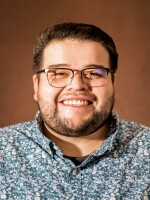Teacher Gene Simmons snapped his fingers each time after asking a question.
“What sound is this?” Simmons asked his class of first and second graders as he pointed to a sheet of paper listing vowel combinations taped to a mirrored wall.
Simmons is a literacy specialist. Not for a school district. Instead, he works for the city of Fort Worth assisting with the municipal government’s after-school and summer reading programs. City officials see the programs, plus new dyslexia screenings, as their way of tackling Fort Worth’s literacy crisis head on.
Thud. Thud.
Simmons rested his left index finger near the vowel digraph ie.
‘Our long-term success’
Across the city of Fort Worth, 2 in 3 students cannot read proficiently.
Those students are in 12 traditional public school districts and 12 charter school networks.
The city government must be part of helping turn around that statistic, Mayor Mattie Parker told the Fort Worth Report.
“The city absolutely needs to play a role in being a resource for families because our long-term success depends on a strong education system — and literacy is the key part of that,” Parker said.
Parker doubled down on reading when she issued an April resolution declaring for the municipal government.
The focus on reading has intensified since the beginning of the 2024-25 school year. The data explains the sense of urgency from and the mayor to the .
Parker is optimistic.
“We are all refocusing efforts on what’s best for students,” she said.
‘Intervention is prevention’
Caroline James, a Fort Worth educator, knows firsthand the impact of missing a child’s learning disability. Her son’s dyslexia went undiagnosed for several years, she said.
James is now leading a joint dyslexia screening effort between the city of Fort Worth and the Sid W. Richardson Foundation called the .
A recent pilot of the program helped 20 students, according to city officials.
Screenings will take place during the city’s summer camps at Chisholm Trail, Como, Diamond Hill, Fire Station, Riverside and Victory Forest community centers.
An adult will read a series of questions aligned with an early literacy skills test.
The test does not diagnose. Instead, the screening indicates where children may have issues and Literacy Roundup staff connect parents with resources, James said.
Students also are paired with a member of the who advocates for that child.
“Intervention is prevention,” James recently told City Council members. “These kids are problem solvers. They’re amazing. We just need to come alongside those families and support them and change their lives.”
‘A big win’
Fort Worth added literacy efforts into its after-school programs and summer camps starting in 2018.
The initial goal? Prevent students from academically regressing — or what’s more commonly known as summer slide.
Seven years later, nearly all students in the city’s summer camps either maintained or grew their reading skills and avoided a back slide, said Eric Lopez, a Fort Worth Park & Recreation district superintendent.
“That was a big win for us,” Lopez said.
The city works with to determine students’ academic standing. They’re tested when they begin camp and when they leave, Lopez said.
Parents also can choose for the city to access their child’s academic records, if they attend Fort Worth ISD. The option provides city staff with a more precise baseline for measuring students’ progress.
During the summer, students receive at least 60 minutes of literacy-infused programming.
During the school year, students receive at least 20 to 30 minutes of reading instruction three times a week.
‘Spell some words’
Paper rustled against the clear plastic bags. Students wiggled their fingers, separating cutouts of letters.
“I want you to spell some words,” Simmons, their literacy specialist, told them. “Pull out the letters ie.”
The sound of crackling paper and plastic filled the pause in instructions.
“I want you to spell the word pie,” Simmons said, slowly roaming around his students’ desks. “That doesn’t look like a p to me.”
The lesson is simple: Simmons breaks down small, three-letter words, so students learn the number of syllables and the sound of each vowel and consonant. The physical manipulation of paper letters reinforces the lessons.
Then he ratchets up the difficulty. Yet the same basic skills apply.
The formulaic approach works, he said.
Even more so for Simmons, whose 9-to-5 job is as a Fort Worth ISD teacher.
His subject?
Math.
Disclosure: The Sid W. Richardson Foundation has been a financial supporter of the Fort Worth Report. News decisions are made independently of our board members and financial supporters. Read more about our editorial independence policy .
Jacob Sanchez is a senior education reporter for the Fort Worth Report. Contact him at jacob.sanchez@fortworthreport.org or .
This first appeared on and is republished here under a .


